初中英语-不定代词用法详解(最新整理)
不定代词的用法归纳
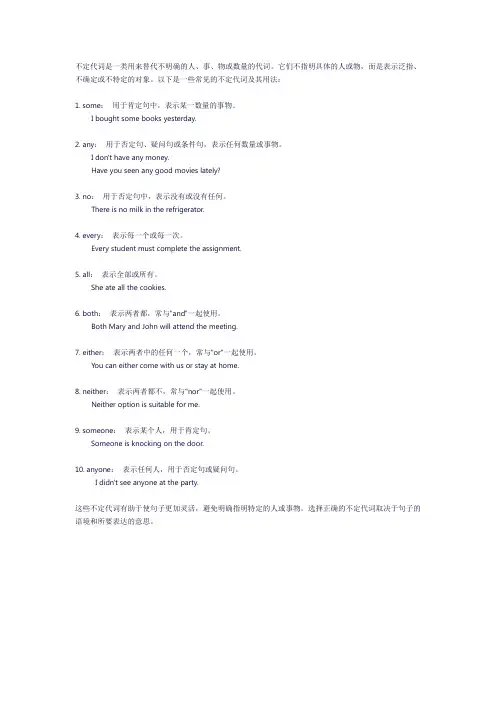
不定代词是一类用来替代不明确的人、事、物或数量的代词。
它们不指明具体的人或物,而是表示泛指、不确定或不特定的对象。
以下是一些常见的不定代词及其用法:1. some:用于肯定句中,表示某一数量的事物。
I bought some books yesterday.2. any:用于否定句、疑问句或条件句,表示任何数量或事物。
I don't have any money.Have you seen any good movies lately?3. no:用于否定句中,表示没有或没有任何。
There is no milk in the refrigerator.4. every:表示每一个或每一次。
Every student must complete the assignment.5. all:表示全部或所有。
She ate all the cookies.6. both:表示两者都,常与"and"一起使用。
Both Mary and John will attend the meeting.7. either:表示两者中的任何一个,常与"or"一起使用。
You can either come with us or stay at home.8. neither:表示两者都不,常与"nor"一起使用。
Neither option is suitable for me.9. someone:表示某个人,用于肯定句。
Someone is knocking on the door.10. anyone:表示任何人,用于否定句或疑问句。
I didn't see anyone at the party.这些不定代词有助于使句子更加灵活,避免明确指明特定的人或事物。
选择正确的不定代词取决于句子的语境和所要表达的意思。
(完整版)不定代词用法归纳
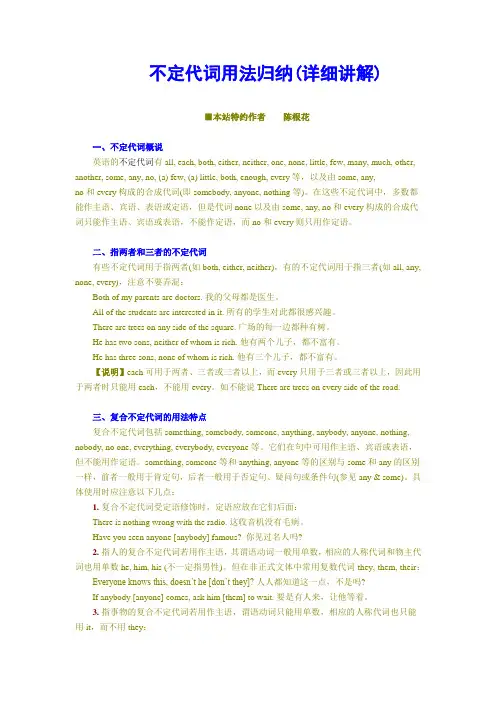
不定代词用法归纳(详细讲解)■本站特约作者陈根花一、不定代词概说英语的不定代词有 all, each, both, either, neither, one, none, little, few, many, much, other, another, some, any, no, (a) few, (a) little, both, enough, every 等,以及由 some, any,no 和 every 构成的合成代词(即somebody, anyone, nothing 等)。
在这些不定代词中,多数都能作主语、宾语、表语或定语,但是代词 none 以及由 some, any, no 和 every 构成的合成代词只能作主语、宾语或表语,不能作定语,而 no 和 every 则只用作定语。
二、指两者和三者的不定代词有些不定代词用于指两者(如both, either, neither),有的不定代词用于指三者(如all, any, none, every),注意不要弄混:Both of my parents are doctors. 我的父母都是医生。
All of the students are interested in it. 所有的学生对此都很感兴趣。
There are trees on any side of the square. 广场的每一边都种有树。
He has two sons, neither of whom is rich. 他有两个儿子,都不富有。
He has three sons, none of whom is rich. 他有三个儿子,都不富有。
【说明】each 可用于两者、三者或三者以上,而 every 只用于三者或三者以上,因此用于两者时只能用 each,不能用 every。
如不能说 There are trees on every side of the road.三、复合不定代词的用法特点复合不定代词包括 something, somebody, someone, anything, anybody, anyone, nothing, nobody, no one, everything, everybody, everyone 等。
(完整)不定代词讲解(初中英语语法)
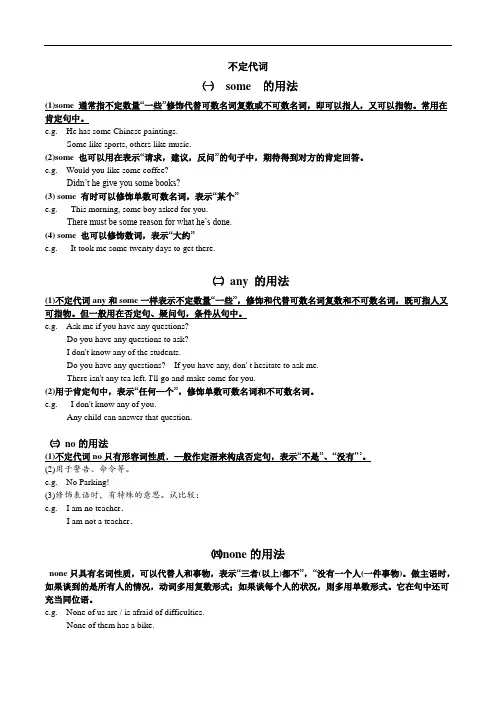
不定代词㈠some 的用法(1)some 通常指不定数量“一些”修饰代替可数名词复数或不可数名词,即可以指人,又可以指物。
常用在肯定句中。
e.g. He has some Chinese paintings.Some like sports, others like music.(2)some 也可以用在表示“请求,建议,反问”的句子中,期待得到对方的肯定回答。
e.g. Would you like some coffee?Didn’t he give you some books?(3) some 有时可以修饰单数可数名词,表示“某个”e.g. This morning, some boy asked for you.There must be some reason for what he’s done.(4) some 也可以修饰数词,表示“大约”e.g. It took me some twenty days to get there.㈡any 的用法(1)不定代词any和some一样表示不定数量“一些”,修饰和代替可数名词复数和不可数名词,既可指人又可指物。
但一般用在否定句、疑问句,条件从句中。
e.g. Ask me if you have any questions?Do you have any questions to ask?I don't know any of the students.Do you have any questions? If you have any, don' t hesitate to ask me.There isn't any tea left. I'll go and make some for you.(2)用于肯定句中,表示“任何—个”,修饰单数可数名词和不可数名词。
e.g. I don't know any of you.Any child can answer that question.㈢no的用法(1)不定代词no只有形容词性质.—般作定浯来构成否定句,表示“不是”、“没有"’。
初三不定代词知识点总结归纳
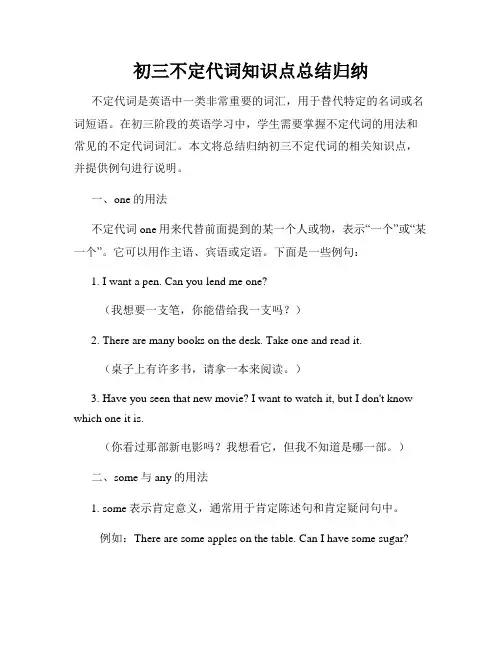
初三不定代词知识点总结归纳不定代词是英语中一类非常重要的词汇,用于替代特定的名词或名词短语。
在初三阶段的英语学习中,学生需要掌握不定代词的用法和常见的不定代词词汇。
本文将总结归纳初三不定代词的相关知识点,并提供例句进行说明。
一、one的用法不定代词one用来代替前面提到的某一个人或物,表示“一个”或“某一个”。
它可以用作主语、宾语或定语。
下面是一些例句:1. I want a pen. Can you lend me one?(我想要一支笔,你能借给我一支吗?)2. There are many books on the desk. Take one and read it.(桌子上有许多书,请拿一本来阅读。
)3. Have you seen that new movie? I want to watch it, but I don't know which one it is.(你看过那部新电影吗?我想看它,但我不知道是哪一部。
)二、some与any的用法1. some表示肯定意义,通常用于肯定陈述句和肯定疑问句中。
例如:There are some apples on the table. Can I have some sugar?2. any表示否定或疑问意义,通常用于否定陈述句和疑问句中,也可以用于条件句中。
例如:I don't have any money. Is there any milk left? If you have any questions, please let me know.三、no、none和neither的用法1. no表示“没有”的意思,通常用于修饰可数名词或不可数名词。
例如:There is no water in the glass. Yesterday, I received no phone calls.2. none表示“没有一个”的意思,可用作代词或形容词,用于修饰可数名词或不可数名词。
(完整)初中英语语法不定代词讲义
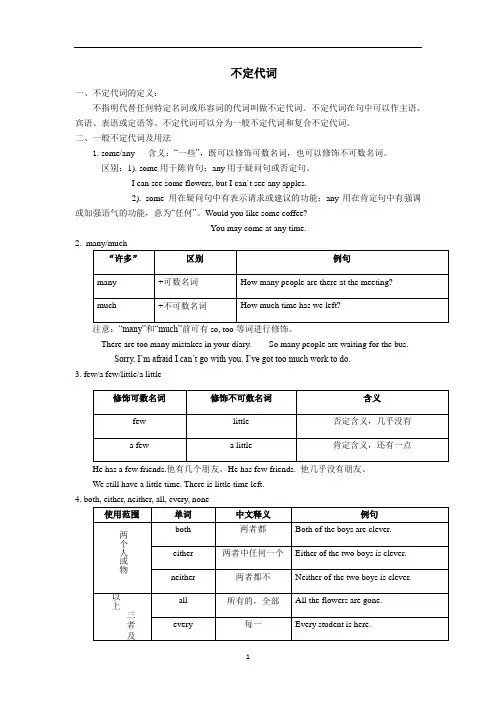
不定代词一、不定代词的定义:不指明代替任何特定名词或形容词的代词叫做不定代词。
不定代词在句中可以作主语、宾语、表语或定语等。
不定代词可以分为一般不定代词和复合不定代词。
二、一般不定代词及用法1. some/any 含义:“一些”,既可以修饰可数名词,也可以修饰不可数名词。
区别:1). some用于陈肯句;any用于疑问句或否定句。
I can see some flowers, but I can`t see any apples.2). some 用在疑问句中有表示请求或建议的功能;any用在肯定句中有强调或加强语气的功能,意为“任何”。
Would you like some coffee?You may come at any time.2. many/much注意:“many”和“much”前可有so, too等词进行修饰。
There are too many mistakes in your diary. So many people are waiting for the bus.Sorry, I’m afraid I can’t go with you. I’ve got too much work to do.3. few/a few/little/a littleHe has a few friends.他有几个朋友。
He has few friends. 他几乎没有朋友。
We still have a little time. There is little time left.4. both, either, neither, all, every, none5. “other” 、“another”、“others”和“the others”I have two pencils. One is yellow, the other is red.I don’t like this green pencil, please give me another one.In our class, some students like playing football, others like playing basketball.There are seven people in Running Man. One is a woman, and the others are men.三、复合不定代词及用法1. 复合不定代词的构成:复合不定代词是由some-,any-,no-,every-加上-one,-body,-thing 所组成的不定代词。
(完整版)不定代词用法总结
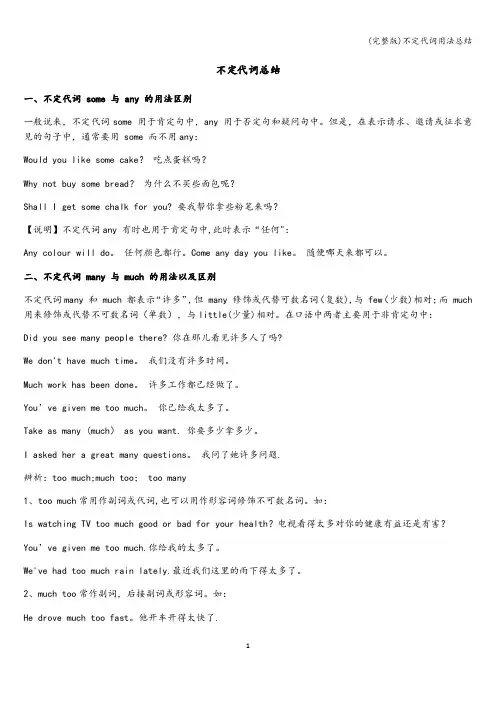
不定代词总结一、不定代词 some 与 any 的用法区别一般说来,不定代词some 用于肯定句中,any 用于否定句和疑问句中。
但是,在表示请求、邀请或征求意见的句子中,通常要用 some 而不用any:Would you like some cake?吃点蛋糕吗?Why not buy some bread?为什么不买些面包呢?Shall I get some chalk for you? 要我帮你拿些粉笔来吗?【说明】不定代词any 有时也用于肯定句中,此时表示“任何":Any colour will do。
任何颜色都行。
Come any day you like。
随便哪天来都可以。
二、不定代词 many 与 much 的用法以及区别不定代词many 和 much 都表示“许多”,但 many 修饰或代替可数名词(复数),与 few(少数)相对;而 much 用来修饰或代替不可数名词(单数),与little(少量)相对。
在口语中两者主要用于非肯定句中:Did you see many people there? 你在那儿看见许多人了吗?We don't have much time。
我们没有许多时间。
Much work has been done。
许多工作都已经做了。
You’ve given me too much。
你已给我太多了。
Take as many (much) as you want. 你要多少拿多少。
I asked her a great many questions。
我问了她许多问题.辨析:too much;much too; too many1、too much常用作副词或代词,也可以用作形容词修饰不可数名词。
如:Is watching TV too much good or bad for your health?电视看得太多对你的健康有益还是有害?You’ve given me too much.你给我的太多了。
不定代词用法详解
不定代词用法总结1. some, any的用法some和any通常用于表示不定数或不定量,修饰复数可数名词或不可数名词。
some表示“几个;一些;部分”,多用于肯定句;而any表示“一些;什么;任何;”对用于否定句或疑问句中。
如:He asked me some questions. (他问了我几个问题。
)Some of the bread has been eaten. (面包已吃了一些。
)Are there any stamps in this post office? (这个邮局里有邮票吗?)I didn’t have any cigarettes, so I went out to buy some. (我没有香烟了,所以出去买了一些。
)2.复合不定代词的用法a. 不定代词some, any, no与-one, -body, -thing可以组成九个复合代词。
它们是:someone anyone no onesomebody anybody nobodysomething anything nothing这些复合不定代词只有名词的性质,可以作主语、宾语等。
b. 因为some一般用于肯定句,any一般用于否定句或疑问句,no表示完全否定,因此由some, any, no与-one, -body组成的复合代词的用法也一样。
c. 第二部分为-one和-body的复合代词只用于表示人,它们的形式是单数形式,但有时可以用they或them指代。
There is someone in your office. Can you hear them talking? (你办公室里有人。
你听见他们说话了吗?)d. 第二部分为-thing的复合代词只能用于指物。
如:There was something wrong with the car so he had to stopped it.He looked at me and didn’t say anything.Nothing can be done to save her life.e. 这些复合不定代词如果有其它的形容词修饰,形容词必须后置。
初中常用不定代词用法
初中常用不定代词用法 -CAL-FENGHAI-(2020YEAR-YICAI)_JINGBIAN初中常用不定代词用法不指明代替任何特定名词或形容词的代词叫做不定代词。
常用不定代词有:some,any,all ,none,both,either,neither,each, every,other,another,much,many,few,little,one等。
一、不定代词的用法不定代词大都可以代替名词和形容词,在句中作主语、宾语、表语和定语。
1.作主语Both of them are teachers.他们两人都是教师。
2.作宾语I know nothing about this person.我对这个人一无所知。
3.作表语This book is too much for a child.这本书对一个小孩来说太难了。
4.作定语There is a little water in the glass.玻璃杯里有一些水。
二、常用不定代词用法举例1.some 一些,某些,某个不定代词some可以代替名词和形容词,常用在肯定句中作主语、宾语、定语等。
作定语时,它可以修饰可数名词(单、复数皆可)和不可数名词。
例如:Some are doctors,some are nurses.有些人是医生,有些人是护士。
(作主语)2.any一些,任何不定代词any可以代替名词和形容词,常用在否定句或疑问句中作主语、宾语、定语等。
作定语时,它可以修饰可数名词(多为复数)和不可数名词。
例如:There isn’t any ink in my pen.我的钢笔没有墨水。
(作定语)不定代词any有时也可以用在肯定句中,表示"任何的"。
例如:You may come at any time;I’ll be home the whole day.你任何时候来都行,我整天都将呆在家里。
不定代词any也可以用作副词,做状语,表示程度。
七年级上册英语不定代词
七年级上册英语不定代词不定代词是指代替某种人或东西的代词,例如:somebody,something,anybody,anything等等。
这些词可以在句子中作主语、宾语、表语或定语,具体用法如下:1. 不定代词作主语当不定代词作主语时,谓语动词要用单数形式。
例如:- Anything is possible if you work hard.2. 不定代词作宾语当不定代词作宾语时,谓语动词的单复数要根据宾语而定。
例如:- I want to buy something for my mom.(something作buy的宾语)- Does anybody know the answer to this question?(anybody作know的宾语)3. 不定代词作表语当不定代词作表语时,要用it作形式主语。
例如:- It's important to do something for the environment.- It's hard to find anything interesting on TV these days.4. 不定代词作定语当不定代词作定语时,一般放在被修饰的名词之前。
例如:- He doesn't have anything to say.(anything作宾语)- Is there anyone who can help me?(anyone作主语)通过以上对不定代词的介绍,相信大家已经掌握了不定代词的用法。
在平时的英语学习和日常交流中,要多加练习,才能更好地掌握它们的用法,用好它们,提高自己的语言表达水平。
不定代词知识点详解(初中英语专题复习)2
其他。必须单独使用,泛指别人或别的东西,常用于"some... others"结构
Some are red, and others are black. 一些是红的,另一些是黑的。
the other
两个中的另一个,剩下的一个。特指,常用于"one... the other..."结构
She has two sisters — one is a nurse, and the other is a teacher. 她有两个姐姐,一个是护士,另一个是老师。
易错警示:
every day与everyday的区别:
1. every day是名词短语,在句中充当状语,修饰整个句子。
I finish my homework before everyday是形容词,在句中充当定语,修饰名词。
Everyday work makes me bored. 每天的工作让我很烦。
②either作主语时,谓语动词应使用单数形式;作定语时,修饰单数名词。
You can park on either side of the street. 你在街道的哪边停车都可以。
The two guests have arrived and either is welcome. 两个客人都到了,而且都受欢迎。
知识拓展:both作主语时,谓语动词使用复数形式;作主语的同位语时,位于be动词、助动词之后,行为动词之前。
Both of them have been to Beijing. 他们两人都去过北京。
They all enjoyed it. 他们都喜欢它。
none
①意为"没有人,没有一个,一点儿也没有,作主语和宾语,不作定语;
- 1、下载文档前请自行甄别文档内容的完整性,平台不提供额外的编辑、内容补充、找答案等附加服务。
- 2、"仅部分预览"的文档,不可在线预览部分如存在完整性等问题,可反馈申请退款(可完整预览的文档不适用该条件!)。
- 3、如文档侵犯您的权益,请联系客服反馈,我们会尽快为您处理(人工客服工作时间:9:00-18:30)。
不定代词用法详解不定代词,不明确指代某个特定的人或事物的代词叫不定代词。
不定代词可以代替名次和形容词,表示不同的数量概念。
不定代词没有主格和宾格之分,在句中可做主语、宾语、表语、定语等。
英语中的不定代词常常成对出现,如some 和any, all 和both, neither 和either, each 和every, other 和another, much 和many, one 和no, none 和no one, few 和a few,little 和a little,等等。
另外,还有由some, any, every, no 与body, one, thing 构成的复合不定代词(somebody, anybody, everybody, nobody, someone, anyone, everyone, no one, something, anything, everything, nothing)。
1.some 和anysome 和any 都可修饰或指代可数名词和不可数名词;some 一般用于肯定句,any 一般用于疑问句和否定句。
如:I must get some fruit in the market. 我得在市场上买点水果。
Do you have any books for children? 你有适合小孩子看的书吗?【说明】(1) 当表示请求或要求并希望对方能给出肯定的回答时,some 也可用于疑问句;any 表示“任何的”之意时,也可用于肯定句。
Can you give me some paper? 你能给我些纸吗?Why not send that girl some flowers? 为什么不送给那位女孩几束花呢?You can read any of the books. 你可以看这些书中的任何一本。
(2) some 和any 均不能跟冠词连用。
2.all 和both(1)all 表示全部,表示三者或三者以上的人或物;both 指代两个人或事物,表示两者都。
Copper and silver are both metals. 铜和银都是金属。
Both sides are keen to reach an agreement. 双方都很想达成协议。
She and her husband both like dancing. 她和丈夫都喜欢跳舞。
There are trees on both sides of the street. 街道两旁都有树。
Not all women like the word Ms. 并非所有的女性都喜欢Ms 这个词。
(2)all 和both 都可以与定冠词连用,置于定冠词之前。
Are all the students here today? 今天所有的学生都到了吗?【说明】在句子中用作同位语时,一般放在行为动词之前,情态动词、系动词be 或助动词之后,但当行为动词或表语省略时,all, both 放在情态动词、系动词be 或助动词之前。
They haven’t been there, but we both have. 我们没有去过那儿,但我们俩去过。
(3)All,both 与not 连用表示部分否定。
All birds can not fly. 不是所有的鸟都会飞。
All that glitters is not gold. 并不是所有发光的都是金子。
Both men and women are not of the same character. 男人和女人的性格特点不都一样。
3.neither 和eitherneither 和either 均用于指两者,neither 意为“两者都不”,either 意为“两者之一”、“任意一方”。
如:Neither of us enjoy getting up early. 我们俩谁也不喜欢早起。
There are trees on either side of the street. 街道两边都有树。
She’s the kind of person you either love or hate. 她是那种叫你不是爱就是恨的人。
Here are two shirts ,you can take either of them. 这儿有两件衬衫,你拿哪件都可以。
I agree with neither of you. 你们两人的意见我都不同意。
【说明】(1)只用于指两者,指三者或多者要用none 和any。
(2)neither 有时可视为either 的否定式,即neither= not either。
(3)两者均可修饰名词,但被修饰名词要用单数形式。
4.each 和every(1)each 强调个体,指两者或两者以上的人或物,在句子中可用作主语、宾语,也可做定语(修饰单数可数名词);every 强调全体,只能指三者或三者以上的人或物,在句子中只能做定语,修饰单数可数名词。
Each has something to say. 每个人都有话要讲。
Each child was given a Christmas gift. 每个孩子都得到了圣诞礼物。
You should give 20 dollars to each. 你应该给每个人20 美元。
Every minute is important to us. 每一分钟对我们都是重要的。
I read English every morning. 我每天早晨读英语。
(2)each of 后面直接接人称代词复数(us,them,you),不能直接接名词,必须在复数名词前加限定词(the 或my,his,her,our 等物主代词)Each of us has got something to say.Each of my sisters has a storybook.(3)两个用and 连接的名词若受each 或every 修饰且用作主语时,其谓语依然用单数。
如:Every [Each] boy and girl has one. 每个男孩和女孩都有一个。
但是,each 用于复数主语后作同位语,后面的谓语用复数。
如:The students each have a dictionary. 学生每人有一本字典。
(4)every 后接“数字或few +名词”可表示“每……”,而each 一般这样用。
如:He comes home every two weeks. 他每隔两周回家一次。
注意:(1) each 指两者或两者以上的“每个”,every 指三者或三者以上“每个”,因此指两者时只能用each。
如:He could write with either hand. 他两只手都能写字。
(2) every 可受almost, nearly 等副词的修饰,但each 却不能。
5.one, another(1)one 指一个或相似的一个;another 指另外的一个,表泛指。
如:Please give me another. 请给我另一个。
I haven’t a book; can you lend me one? 我没有书,你能借我一本吗?【说明】another 可以修饰one,但one 不能修饰another。
如:Please give me another one. 请给我另一个。
(2)one 可与this, that, the 等连用,表示特指;another 不能与这些词连用,也不能表示特指。
如:This one is better than the one over there. 这个比那边的那个好些。
(3)在一定范围内,表示其中的一个用one,表示另一个可用one 或another。
如:One boy was reading; one [another] was writing. 一个男孩在读书,另一个在写字。
注意:若指两者中的一个和另一个,则用one…the other。
6.other, the other, others, the others(1)带定冠词的the other, the others 表特指,而不带定冠词的other, others 表泛指。
如:Don’t cut in when others are talking. 别人说话时别插话。
Only Jim was there. The others had left. 只有吉姆在那儿,其余的人都离开了。
(2)other 和the other 后可修饰名词,也可单独使用;而others 和the others 则只能单独使用,不能修饰名词。
如可说the other people,但不能说the others people。
(3)other 和the other 既可表示单数也可表示复数,具体视它所表代替或修饰名词的单复数而定,而others 和the others 则永远表示复数。
(4)注意正确理解以下短语的意思:every other 每隔一……,其他的……都none other than 不是别的,正是…… no other than 不是别的,正是…… one after the other 一个接一个地,相继one from the other 分别,各别some . . . or other 某一个other than 不同于,除了the other day 早几天,几天前7.much 和manymuch 修饰或指代不可数名词,many 修饰或指代可数名词(复数)。
His name is familiar to many people. 他的名字许多人熟悉。
The children have too much homework to do. 孩子们家庭作业太多。
【说明】many 的以下用法应需注意:(1)a great many 许多(后接可数名词的复数)。
(2)many a 后接单数可数名词,相于many 后接复数名词,如many a time=many times(许多次)。
8.none 和no one(1)none 后指人或物,其后通常接表示范围的of 短语;no one 通常只用于指人,不用于指物,且其后习惯上接表示范围的of 短语。
(2)no one 用作主语时,谓语动词用单数;none 用作主语时,若指不可数名词,谓语用单数,若指可数名词,则谓语可用单数(较正式)也可用复数(用于非正式文体,但更符合惯用法)。
No one [=Nobody] likes it. 没人喜欢它。
None of the books is [are] interesting. 没有一本书有趣。
